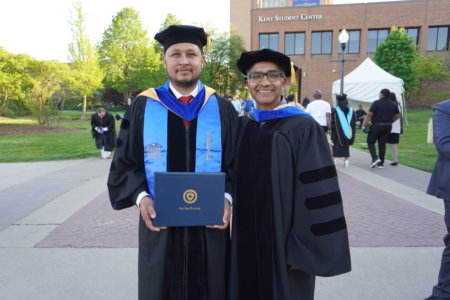
Since the foundation of the World Health Organisation in 1948 and the widening access and production of antibiotics in the 1950s, the field of public health has achieved many memorable successes.
Yet, mankind has faced just as many unprecedented global challenges since then. Polio, malaria, HIV, Ebola, COVID-19, and more recently, monkeypox – time and again, humanity has scrambled to deal with these undiscovered pathogens and emerging diseases.
Each new outbreak reminds us of the need to unite experts across disciplines to focus on the economic, political and social causes of poor health. With the climate crisis, an ageing population, and more significant social transformations of the 21st century, the need for new public health leaders to step up and take charge of the health and well-being of future populations has never been greater.
What will position you as a leader in such a major field? For a well-rounded global perspective and advanced skills, knowledge, and experience in this dynamic field, join the leading schools of public health below:

The JC School of Public Health and Primary Care offers an exceptional learning experience for students aspiring to tackle global health challenges. Source: The Chinese University of Hong Kong
The Chinese University of Hong Kong
For an exceptional public health education, look no further than the JC School of Public Health and Primary Care, The Chinese University of Hong Kong (JCSPHPC). The school is the first and only institution in the region that provides a platform that integrates public health, primary care and family medicine teaching and research. Its impact goes far – 18 researchers from the school are among the top 2% of scientists in the world. Such achievements are reflected in its rankings; the school is part of the top medical schools in the world, ranked 28th globally, second in the entirety of Asia, and first in Hong Kong. QS World University Rankings and Times Higher Education have also put CUHK on the map as a Top 10 university in Asia.
It’s no surprise that public health students here thrive. They are led by experts in the field – teachers and world-renowned professors guide students on theory and practice through epidemiological studies, systematic reviews, and practicums in community and laboratory settings. They are provided with training in a diverse range of rigorous health methodologies, with a strong emphasis on practical research and evaluation skills.
Among the school’s wide offering of programmes, its Master of Public Health (MPH) is the top choice for those looking to achieve professional competency in this in-demand field. It explores the many facets of public health, blending theory and practice with tailored concentrations that meet international standards. Explore concentrations such as Epidemiology and Biostatistics, Environmental / Occupational Health & Infectious Diseases, Population and Global Health, Health Systems, Policy and Management, and Health Promotion and Social Behaviour.
These excellent concentrations are the reason the programme received accreditation from the Agency for Public Health Education Accreditation (APHEA), a collaboration between the Association of Schools of Public Health in the European Region (ASPHER) and the World Health Organisation (WHO). It’s a feat achieved by only the best – the same accreditation is held by other esteemed public health institutes like the London School of Hygiene & Tropical Medicine and the University of Edinburgh.
The Master of Science in Epidemiology and Biostatistics (MScEPB) holds equal prestige as the only programme of its kind in the region. The programme is underpinned by a strong foundation of clinical epidemiology and statistical analysis. Students will learn to design studies, conduct analysis and interpret data for evidence-based patient care and healthcare policy making. This programme is designed to equip students for careers in healthcare organisations, pharmaceutical companies, government agencies, as well as further studies at the doctoral level.
Apply to the JC School of Public Health and Primary Care, The Chinese University of Hong Kong today.

The Johns Hopkins Bloomberg School of Public Health is the first and largest school of public health. Source: The Johns Hopkins Bloomberg School of Public Health
Johns Hopkins University
At the Johns Hopkins Bloomberg School of Public Health, you’re not just trained for the field; you’re meant to lead it, too. The Bloomberg School of Public Health is known for its unrivalled breadth and depth of programs that are hands-on and flexible. Choose from more than 90 degree programs and 40 certificate qualifications in areas such as epidemiology, mental health, and health policy management.
Whether you prefer full-time or part-time study, online or on-campus courses, the school offers flexibility for everyone to advance their careers in public health. Its four-to-one student-to-faculty ratio and small class sizes ensure full participation in a highly interactive environment.
The Master of Health Science in Epidemiology is a two-year academic degree focusing on applied epidemiologic methods. It’s ideal for aspiring epidemiologists with limited or no research experience — they will complete 64 credit units in epidemiology and elective courses, pass a comprehensive exam, produce a publishable-quality manuscript, and present their research during the annual poster symposium.
The learning doesn’t end there: students will be mentored, train with renowned faculty and participate in research teams. With over 80 research centers and institutes available for internships and hands-on experiences, students can get a head start in producing groundbreaking work to improve health in their communities.

UCL’s Master of Public Health is the equivalent of a face-to-face master’s programme, but with the flexibility and accessibility of being fully online. Source: University College London
University College London
Never one to stand still, University College London is always pushing boundaries and charting new territories to advance medical practices. Take for instance the transformative strides made in healthcare; from revolutionising breast cancer treatment with single-dose radiotherapy, benefiting thousands worldwide, to the rapid development of life-saving breathing aids for patients in the thick of the COVID-19 pandemic, its impact is continuously felt on a global scale.
The UCL Faculty of Population Health Sciences is where you’ll find such an impact. With outstanding research centred on improving human health, students and staff unite to work on a multidisciplinary level, sharing knowledge and creating new insights into public health. Research focuses on the behavioural, biological and psycho-social processes which are so central to human life and affect the development of disease.
The department is home to a Master of Public Health (MPH), which offers a flexible, yet interdisciplinary approach to public health education. Taught from a global top 10 university also ranked sixth in the world for public health (Shanghai Ranking 2023), this programme will train you to make a tangible difference in health systems worldwide, with a strong emphasis on equity and inclusion. At the same time, you’ll hone your leadership and communication skills, gaining the confidence needed to thrive as a public health leader.

The Master of Public Health at the University of Melbourne is an internationally recognised degree. Source: University of Melbourne
University of Melbourne
If you’re looking to pursue public health education in Australia, the University of Melbourne, ranked first in Australia and #16 globally for public health, should be your top choice. Public health graduates here find successful employment worldwide, even in career options they never considered – all thanks to the university’s Master of Public Health.
The programme provides students with the essential knowledge and skills for a successful career in public health, preparing them to specialise in fields like epidemiology, global health, and health policy. All specialisations allow students to advance their careers, deepen their knowledge, or explore specific areas of interest.
There are three main components to the programme. The core component offers up to six subjects, providing a multidisciplinary grounding in public health theory and practice, covering vital areas like health systems, communication, and data use.
You can then tailor your curriculum to your career goals with specialisations in fields like climate, environment and health. The university offers 10 specialisations to choose from, and over 60 elective subjects. This is followed by a capstone project, where you apply what you’ve learned in professional placements with public health organisations or a research project.
Completion will take you far. Graduates are highly sought after within Australia and outside of it, with career opportunities in non-governmental organisations, government agencies, healthcare institutions, research centres, and private companies.
*Some of the institutions featured in this article are commercial partners of Study International










